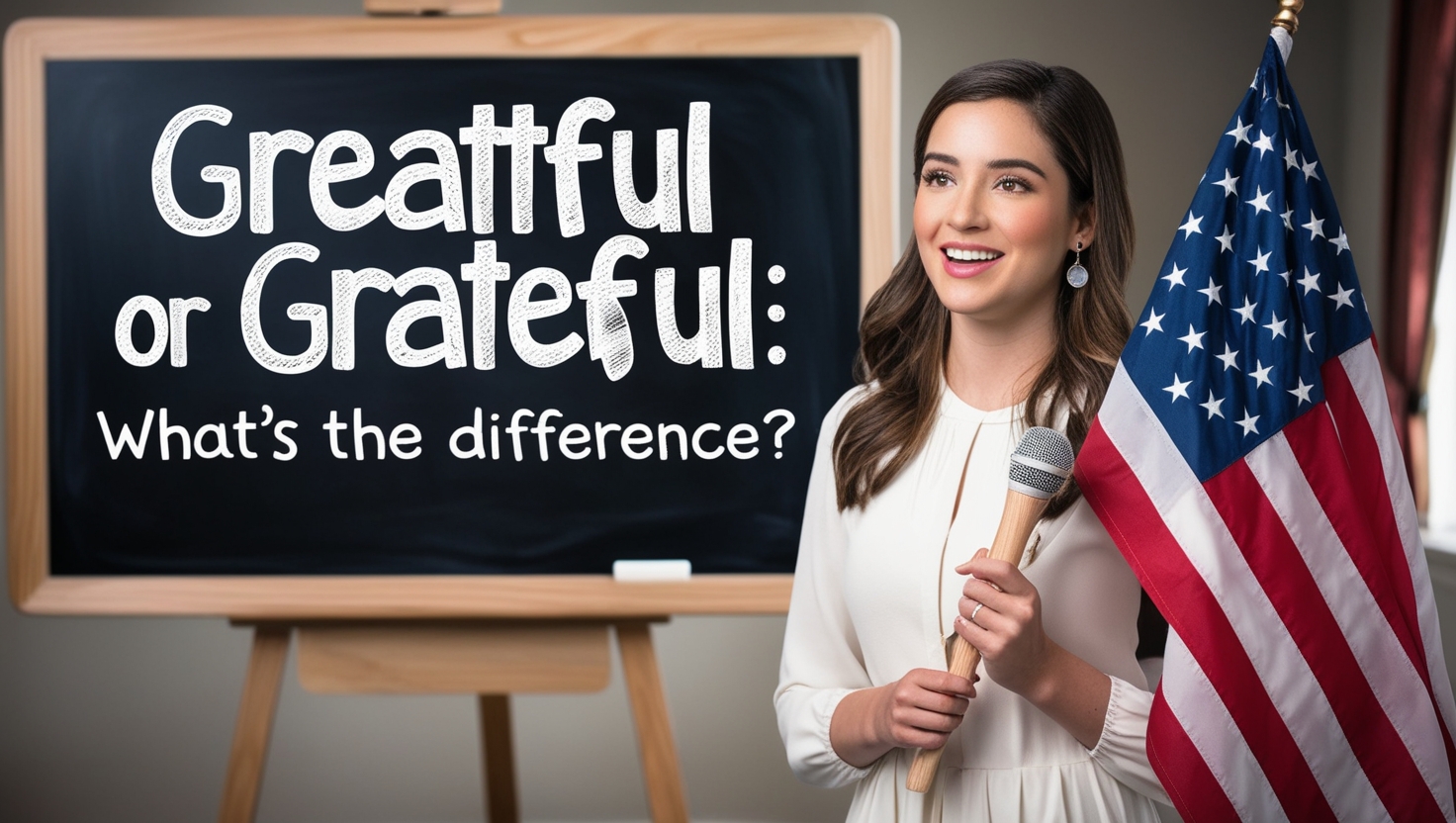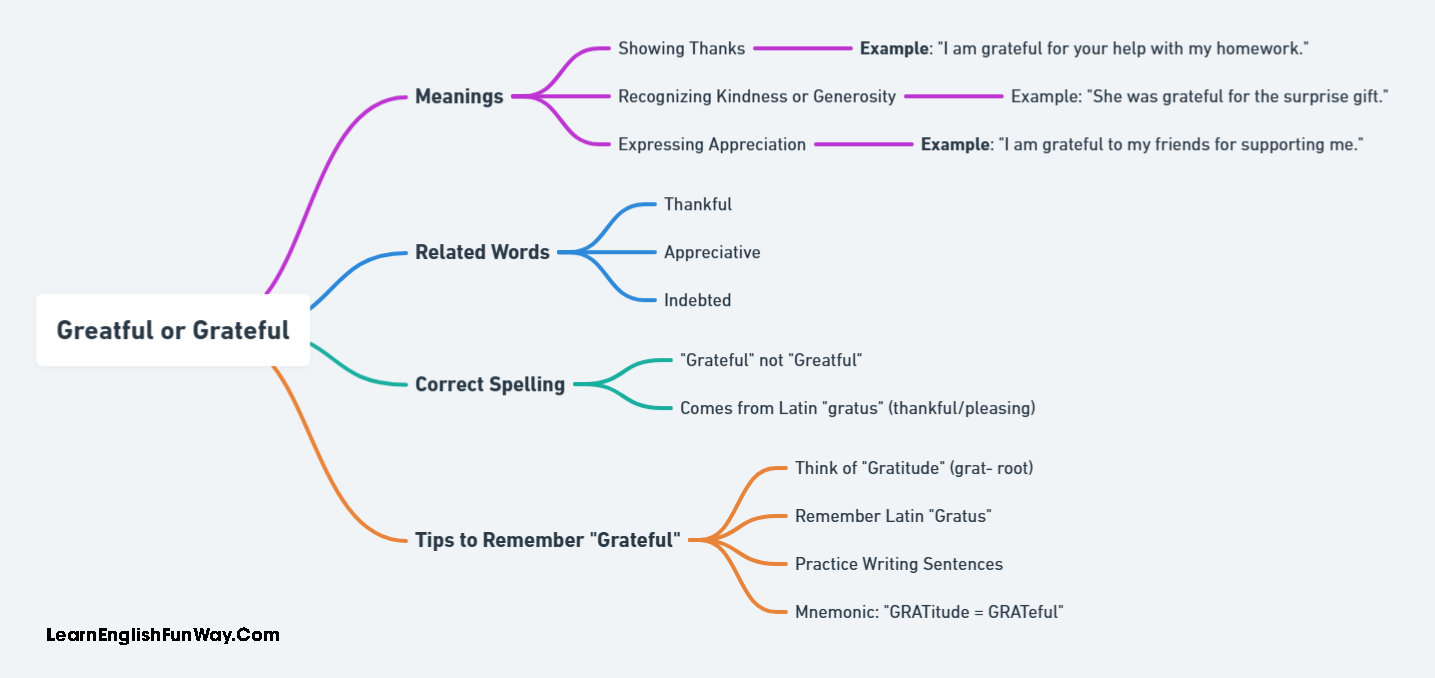Learning English spelling can sometimes be hard. Some English words sound the same but are spelled differently, and small mistakes can change the meaning entirely. One common spelling mistake is the difference between “greatful” and “grateful.” While both look similar, only one of them is correct in English.
In this post, we’ll cover:
- The meaning of “grateful“
- Why “greatful” is incorrect
- Examples of “grateful” in sentences
- Tips to remember the correct spelling
- Frequently asked questions about “grateful” vs. “greatful“
Let’s dive into the details so you can avoid making this mistake in the future!
Table of Contents
1. What Does “Grateful” Mean?
The word “grateful” is an adjective in English. It’s used to show appreciation or thankfulness. When you feel happy and thankful for something someone has done for you, you feel grateful.
Key Meanings of “Grateful“
- Feeling or showing thanks: When you are thankful for something someone has done or given you.
- Example: “I am grateful for your help with my homework.”
- Recognizing kindness or generosity: When you appreciate someone’s kindness.
- Example: “She was grateful for the surprise gift.”
- Expressing appreciation: When you want to say thank you for something.
- Example: “I am grateful to my friends for supporting me.”
Related Words to “Grateful“
Here are some related words that can help you understand “grateful” better:
- Thankful: Feeling or expressing thanks.
- Appreciative: Showing appreciation or gratitude.
- Indebted: Feeling that you owe someone because of their help.
2. Why is “Greatful” Incorrect?
“Greatful” is not a correct spelling in English. People often make this mistake because they think of the word “great.” Since “grateful” sounds like it could be related to “great,” it’s easy to think it should be spelled “greatful.” However, “grateful” has a different root and meaning.
The Root of “Grateful“
The word “grateful” comes from the Latin word “gratus,” which means “thankful” or “pleasing.” It is not related to the word “great.” Although the words sound similar, they are not connected in meaning or spelling.
Simple Rule:
- Always spell it as “grateful.”
- “Greatful” is incorrect and should not be used.
3. Examples of “Grateful” in Sentences
Here are some common ways to use “grateful” in sentences. This will help you understand how to use it in different contexts.
A. To Show Thankfulness
- “I am grateful for your kindness.”
- “We were grateful for the delicious meal.”
- “She felt grateful for the opportunity to learn.”
B. To Express Appreciation
- “I am grateful for my family’s support.”
- “They were grateful for the chance to travel together.”
- “I am grateful to my teacher for her guidance.”
C. To Recognize Generosity
- He was grateful to his friend for lending him money.”
- I am grateful to you for listening to my problems.
- “The children were grateful for the toys they received.”
D. Common Phrases with “Grateful”
- “Forever grateful“: Showing deep and lasting appreciation.
- Example: “I am forever grateful for your help during hard times.”
- “Eternally grateful“: Another way to say “thank you” for something very important.
- Example: “I am eternally grateful for your support.”
These examples should help you see how to use “grateful” in your own sentences.
4. Common Mistakes and How to Avoid Them
It’s easy to confuse “grateful” with “greatful” because they sound alike. Here are some tips to help you remember the correct spelling:
Tip 1: Think of “Gratitude“
The word “grateful” is related to “gratitude,” which also means thankfulness. Since “gratitude” and “grateful” have the same “grat-“ root, you can use “gratitude” to remind you of the correct spelling.
Tip 2: Remember the Latin Root “Gratus“
“Grateful” comes from the Latin word “gratus,” meaning “pleasing” or “thankful.” When you remember the root, it’s easier to remember that there is no “great” in “grateful.”
Tip 3: Practice Writing Sentences
Sometimes spelling mistakes happen because we don’t use the word often enough. Try writing sentences using “grateful” in different contexts. The more you use it, the easier it becomes to remember!
Tip 4: Create a Simple Mnemonic
A mnemonic is a memory trick to help you remember something. For “grateful,” you can use:
- “GRATitude = GRATeful.“
Using this mnemonic can help you remember that “grateful” is about being thankful, not about being “great.”
Tip 5: Practice with Flashcards
If you’re someone who learns well with visuals, make a flashcard with “grateful” on one side and “greatful” (marked as incorrect) on the other. Reviewing flashcards can help reinforce the correct spelling.
5. Frequently Asked Questions (FAQs)
A. Is “Greatful” Ever Correct?
No, “greatful” is never correct in English. The correct spelling is always “grateful.”
B. Why Do People Often Spell It as “Greatful“?
Many people make this mistake because “grateful” sounds like “great.” Since “great” is a common word, it can influence how people think “grateful” should be spelled. However, “great” and “grateful” are not related in meaning or origin.
C. How Can I Remember the Correct Spelling?
Practice and repetition are the best ways to remember! You can also use the mnemonic “GRATitude = GRATeful” or think of “gratitude” to help you remember.
D. Can I Use “Grateful” Instead of “Thankful“?
Yes! In many cases, “grateful” and “thankful” can be used interchangeably. Both words show appreciation, but “grateful” often has a deeper meaning, like being thankful for a kindness or generosity.
6. Fun Facts About “Grateful“
Learning more about a word can make it easier to remember. Here are some interesting facts about “grateful”:
- Latin Roots: The word “grateful” comes from the Latin word “gratus,” which means “pleasing” or “thankful.” This root also gives us words like “gratitude” and “gratuity” (a tip given to a server).
- Positive Word: Studies have shown that people who regularly feel and express gratitude are generally happier and healthier. So, learning to use “grateful” can also remind you to appreciate the good things in life!
- Popular in Song Lyrics: Many songs use the word “grateful” to express deep feelings. For example, the song “Grateful” by Rita Ora is about being thankful for life’s blessings.
7. More Examples and Practice Sentences
To make sure you really understand how to use “grateful,” here are more practice sentences. Try using them in your conversations and writing.
A. Showing Thankfulness
- “I am grateful for the good weather today.”
- “She is grateful to her parents for their support.”
- “We were grateful for the delicious food.”
B. Expressing Deep Appreciation
- “I am grateful for every moment I spend with my family.”
- “The team was grateful for their coach’s dedication.”
- “He is grateful to his friends for helping him through tough times.”
C. Recognizing Someone’s Generosity
- “They were grateful to the teacher for her extra effort.”
- “I am grateful to my friend for always being there for me.”
- “The students were grateful for the scholarship opportunity.”
Using “grateful” can add warmth and sincerity to your sentences. Practice using it daily to make it a natural part of your vocabulary.
8. Exercises to Practice “Grateful“
Let’s try some exercises to reinforce your learning. Fill in the blanks with “grateful” in each sentence:
- I am _____ for your help with my project.
- We feel _____ to be part of this wonderful team.
- She is _____ to have such supportive friends.
- The children were _____ for the gifts they received.
- I am _____ to my parents for their guidance.
Answers:
- grateful
Conclusion
To sum up:
- “Grateful” is the correct spelling when you want to express thankfulness.
- “Greatful” is incorrect and should not be used.
By practicing and using the tips provided, you can confidently avoid this common spelling mistake. Whether you’re writing an email, talking with friends, or expressing gratitude, “grateful” is the word you need.
Keep practicing, and soon spelling “grateful” will feel as natural as saying “thank you.” Happy learning!






